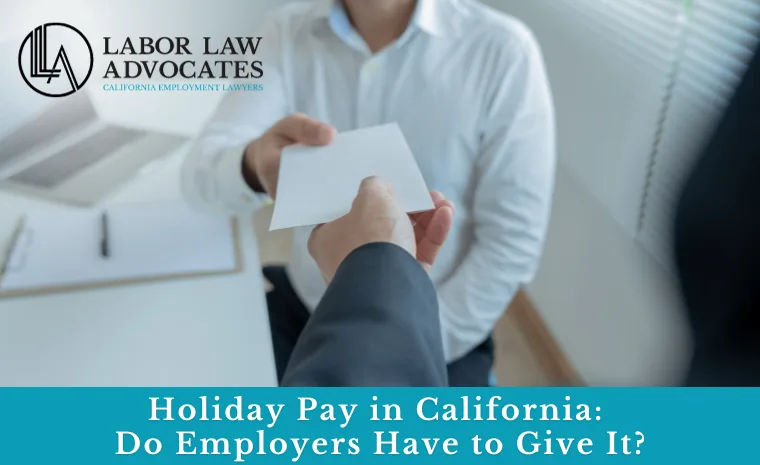Holiday Pay in California: Do Employers Have to Give It?
In the vast expanse of California’s labor landscape, where employment regulations can be very complex, one issue that often baffles both employers and employees is holiday pay.
Holiday pay refers to the compensation that employees receive for working on designated holidays, typically when they would otherwise have the day off. It is a form of additional compensation designed to recognize the inconvenience of working on holidays and to provide a financial incentive to employees who are required to work during these times. However, this practice is not federally mandated. In this blog, we will discuss:
- Holidays recognized by the state of California
- Holiday pay in California
- Taking action after a holiday pay disagreement
- Alternative pay laws that you should know about
Holidays Recognized by the State of California
In general, the state of California recognizes several official holidays, both at the federal level and some additional state-specific holidays. Here are some of the major national holidays recognized in California:
- New Year’s Day (January 1st): A federal holiday celebrated in California and across the United States.
- Martin Luther King Jr. Day (Third Monday in January): Honoring the civil rights leader and observed at both the state and federal levels.
- Presidents’ Day (Third Monday in February): Celebrated in honor of George Washington and Abraham Lincoln, two of the United States’ most prominent presidents.
- Memorial Day (Last Monday in May): A day of remembrance for the men and women who died while serving in the U.S. military.
- Independence Day (July 4th): Celebrating the nation’s independence from Great Britain with fireworks and patriotic festivities.
- Labor Day (First Monday in September): Honoring the American labor movement and the contributions of workers.
- Columbus Day (Second Monday in October): A federal holiday that commemorates Christopher Columbus’s arrival in the Americas.
- Veterans Day (November 11th): A day to honor and thank all military veterans for their service.
- Thanksgiving Day (Fourth Thursday in November): A day for expressing gratitude and sharing a festive meal with family and friends.
- Christmas Day (December 25th): The only religious holiday federally observed, it celebrates the birth of Jesus Christ with various traditions and decorations.
In addition to these federal holidays, California also has some state-specific holidays and observances. However, these are not typically days off for the general population and may vary depending on your employer’s policies. Some California-specific holidays include Cesar Chavez Day (March 31) and Native American Day (Fourth Friday in September).
Disagreements over your holiday pay in California? We can help.

Holiday Pay In California
California’s employers are not required to provide holiday pay to their employees. The state does not have specific laws that mandate employers to pay extra compensation for holidays, such as Christmas or Thanksgiving. Whether an employee receives holiday pay depends on the employer’s policies and any employment contracts or collective bargaining agreements in place.
However, if an employer chooses to provide holiday pay for employee morale, they can establish their own policies regarding the rates and conditions under which such pay is granted. Employees need to review their employment contracts or consult with their employers to understand their company’s specific holiday policy regarding pay.
Additionally, if an employer does decide to provide holiday pay, they must ensure that they comply with all applicable labor laws, including overtime and minimum wage regulations. Employees who work on holidays in California may be eligible for overtime pay if they meet the state’s overtime requirements.
But, if your employer has voluntarily agreed to provide holiday pay, they are generally bound by that agreement. If they are not honoring a clear agreement, you have legal options to address the situation, regardless of the lack of legislation around holiday pay in California:
Taking Action After a Holiday Pay Disagreement
1. Review Your Employment Contract or Agreement
Start by reviewing your employment contract, offer letter, or any written agreement you have with your employer. Check for specific terms and conditions regarding holiday pay, including which holidays are covered, the rate of pay, and any eligibility requirements.
2. Communicate with Your Employer
Approach your employer or HR department to discuss the issue. Share your concerns and provide any evidence that supports your claim for holiday pay. It’s possible that the oversight is unintentional, and a simple conversation can resolve the matter.
3. Document Your Concerns
Keep a record of all communication related to the holiday pay issue, including emails, letters, and notes from meetings or conversations with your employer or HR. This documentation can be valuable if you need to escalate the matter.
4. Contact the California Division of Labor Standards Enforcement
If your discussions with your employer do not resolve the issue, you can contact the California Division of Labor Standards Enforcement (DLSE). You can file a wage claim with the DLSE, providing details of the dispute and any relevant documentation. The DLSE will investigate the matter and, if necessary, take action to enforce the holiday pay agreement.
5. Consider Alternative Dispute Resolution
Mediation or arbitration may be an option to resolve the dispute without going to court. Some employment agreements have clauses that require alternative dispute resolution before pursuing legal action.
6. Seek An Employment Lawyer
Regardless of your options, if you believe that your employer is willfully or knowingly violating the holiday pay agreement and you are not getting the assistance you need from the DLSE, consider consulting a labor attorney to review your case. They can provide legal advice and represent your interests in a legal dispute, and decide the best course of action for your claims.
Any overtime holiday pay agreement should be documented in writing, ideally in your employment contract, employee handbook, or company policy, to avoid misunderstandings, especially if you can use other legal means to get the pay you are entitled to.
Owed some overtime pay? Don’t miss your paycheck.
Alternative Pay Laws That You Should Know About
Regular Overtime Pay
In California, employees are entitled to overtime pay when they work more than eight hours in a single workday or more than 40 hours in a workweek. Overtime pay is usually calculated at a regular rate of 1.5 times the employee’s regular hourly wage.
Double Overtime
When employees work more than 12 hours in a workday, they are entitled to double overtime pay, which is a premium rate usually calculated at twice their regular hourly wage.
Overtime Pay for the Seventh Consecutive Day
If an employee works seven consecutive days in a workweek, they are entitled to overtime pay for the first eight hours of work on the seventh day, and double overtime of their usual rates for any hours worked beyond eight.
Alternative Workweek Schedules
Some employees may have alternative workweek schedules (e.g., 4/10 schedules, where they work four 10-hour days instead of five 8-hour days). In such cases, overtime is calculated differently, and employees are entitled to overtime after working more than the agreed-upon hours in the schedule.
Exemptions
Not all employees are eligible for overtime. Certain exemptions apply to salaried, managerial, and professional employees. However, these exempt employees are subject to specific criteria, including salary thresholds and job duties.
Minimum Wage and Overtime
California’s minimum wage laws are also important to consider, as overtime pay is calculated based on the minimum wage rate. When the minimum wage increases, it can affect the overtime rate as well.
Meal and Rest Breaks
Employees are entitled to meal and rest breaks under California law, which can impact overtime calculations. Failure to provide these breaks may result in additional compensation.
Agreements and Collective Bargaining
Employment contracts, union agreements, and collective bargaining agreements may contain specific provisions related to overtime pay. Employers must adhere to these agreements.
Legal Penalties
Employers who fail to provide employees with the correct overtime pay can face penalties, including fines and back pay owed to the affected employees.
Both employers and employees to be aware of these rules and ensure compliance with California’s labor laws. Keep in mind that labor laws can change, so consulting with an employment attorney or the California Department of Industrial Relations can provide additional guidance on a situation involving overtime holiday pay.
Find the Defense You Deserve
In California, while employers are not forced to concede holiday pay, they must adhere to strict guidelines outlined in the California Labor Code. Employees should be aware of their rights and take action if they suspect their rights or agreements are being compromised.
By staying informed and proactive, workers can ensure they receive fair compensation for their hours of holiday pay while holding employers accountable for adhering to the law. If faced with unlawful overtime demands, employees have the resources and tools to protect their rights and seek justice.
Labor Law Advocates is dedicated to protecting your rights while holding employers accountable for cases of unpaid overtime or unlawful forcing of overtime. Consult with the most qualified employment attorney in California for legal advice today. Speak with one of the experts at Labor Law Advocates for a free consultation.
We are available 24/7. Call us anytime at (424)-688-3632.




